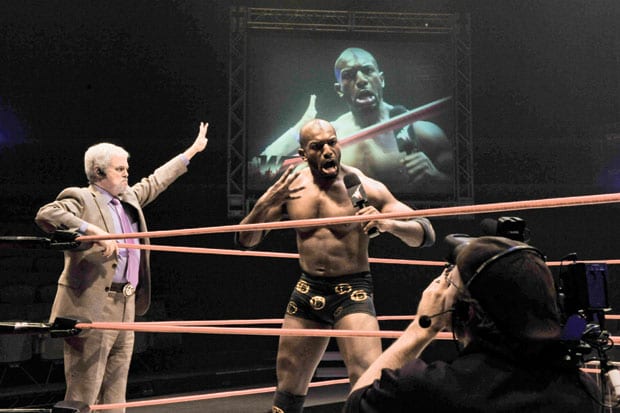Idealism, from the Founding Fathers in ‘1776’ to pro wrestlers in ‘Chad Deity’

TALKIN’ SMACK | Blustery wrestling star Chad Deity (Corey Jones) embodies American consumerism — and not in a good way. (Photo courtesy Karen Almond)
As sports go, pro wrestling is certainly the chattiest. Golf is a game of whispers, baseball of nods, tennis of grunts and football of shouted play, but wrestling? It’s about talkin’ smack. It’s the most theatrical of athletic enterprises, if you don’t count the gymnastics closeted movie stars go through.
 You might not realize how talky and theatrical until you see a talky piece of theater like The Elaborate Entrance of Chad Deity, a dandy and sly play at the Wyly set in the world of pro wrestling. For Mace Guerra (Alex Hernandez), the protagonist who narrates much of the play, the sport is an art form: A combination of ballet, bodybuilding and Barnum. Where his brothers enjoyed watching the WWE’s stars, Mace reveled in the skill it took to be their opponents. He was that rare kid who rooted for the Washington Generals to beat the Harlem Globetrotters.
You might not realize how talky and theatrical until you see a talky piece of theater like The Elaborate Entrance of Chad Deity, a dandy and sly play at the Wyly set in the world of pro wrestling. For Mace Guerra (Alex Hernandez), the protagonist who narrates much of the play, the sport is an art form: A combination of ballet, bodybuilding and Barnum. Where his brothers enjoyed watching the WWE’s stars, Mace reveled in the skill it took to be their opponents. He was that rare kid who rooted for the Washington Generals to beat the Harlem Globetrotters.
All that makes Mace a virtual nonentity in the AWA, whose star, Chad Deity (Corey Jones) has more braggadocio than P. Diddy in a Hennessy commercial. He’s one of those heroic villains of the sport, trash-talkin’ but also embodying successful consumerism in its most blatant form.
Which is part of what makes the play Chad Deity so compelling (well, that and a host of well-built men in bikini briefs who don’t expect you to put dollar bills in their G-strings).
Playwright Kristoffer Diaz sets up a delicious series of dialectics — race vs. race, ethics vs. celebrity, steak vs. sizzle — and juggles them all, while staying within the framework of a “fake” sport. (It doesn’t feel fake when the floor shakes during a powerbomb.)
Hernandez, as sculpted and compact as a Henry Moore statue, has a sexy Wolverine vibe going for him, but also has mastered Diaz’s street patois to give wrestling a dreamy lyricism. As Deity, Jones’ shiny head, cape and dominance make him seem like an African-American version of Ming the Merciless. Aly Mawji, as the Bengali hustler who tries to turn wrestling’s stereotypes on its head, gives a jolt to the more expository scenes.
Add to all of this an actual wrestling ring as a set (with moving seats!) and the necessity for audience participation, and this production captures both the thrill of the sport and the inherent flaws of our current culture. The American dream has become more about being American than having dreams.
That’s not so for the characters in 1776, Lyric Stage’s latest full-on revival of a Broadway classic. Back then, even defining what an “American” meant was subject of congressional debate. For obnoxious John Adams (Brian Gonzales), pensive Thomas Jefferson (Bryant Martin) and wily Ben Franklin (David Coffee, perfectly cast), it required a declaration.
Sherman Edwards’ songs are a hodgepodge of operatic (some good, but jarringly slow) and amusing barbershop harmonies (“The Egg,” “But Mr. Adams”), but it’s not exactly radio-friendly pop. That would be OK if there weren’t huge passages without music (after a quick succession of four numbers in Act 1, there’s nothing but speechifying for 40 minutes). Sometimes, in the name of verisimilitude, 1776 becomes the dry political debate it portrays.
But damn if you don’t feel a little more patriotic by the end. With the election around the corner, you can’t help but observe the behavior of these “fine conservative men” who oppose independence and think where we would be if we didn’t embrace a bit of liberalism in our national characters.
This article appeared in the Dallas Voice print edition November 2, 2012.

